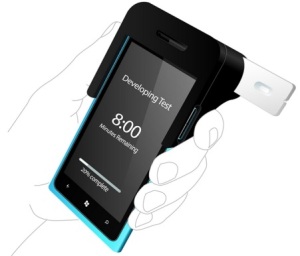After a visit to Uganda, a research team leader was inspired to develop a medical laboratory tool for diagnosing adrenal disorders
Saliva and the smartphone do not appear to be a harmonious pair, particularly as elements of a method to remotely perform a medical laboratory test for cortisol. But new research at Intermountain Medical Center in Murray, Utah, suggests they can work together to help physicians remotely conduct cortisol tests.
Intermountain Healthcare is an internationally recognized, nonprofit healthcare system based in Salt Lake City, Utah, with 22 hospitals, more than 185 physician clinics, and 33,000 employees throughout the state of Utah, as well as an affiliated health insurance company, SelectHealth.
Method for Affordable Monitoring of Adrenal Gland Diseases
Pathologists know that cortisol, a steroid hormone produced by the adrenal gland, is a critical indicator of patients’ adrenal gland function and diabetic health.
This diagnostic tool taps new smartphone technology to affordably and easily monitor adrenal gland diseases based on saliva specimens, according to a news release issued by the medical center. It includes an attached device that feeds the results of the test into the smartphone and an app that quantifies and interprets the saliva assay.
This point-of-care test is important for at least two reasons. First, it is another example of how smartphone technology can help patients to self-monitor their health from home. And, it provides an inexpensive approach to cortisol measurement that may help to address the need for inexpensive, accessible diagnostic tests in developing nations.
Device Gives Diabetics and Others Easy Access to Cortisol Levels
This new diagnostic tool screens patients for Cushing’s syndrome, an adrenal gland disease. It can also aid in identifying adrenal insufficiency, monitoring cortisol replacement, and assessing changes in adrenal function, according to the Intermountain news release.
Measuring cortisol, also known as the “stress hormone,” is not so easy to do, researchers noted.

Joel Ehrenkranz, M.D. (pictured above), and his research team at Intermountain Medical Center are finalists in the Nokia Sensing XChallenge, an international competition for innovation in healthcare. Their device is a tool that, when paired with a smart phone device and app, can detect levels of cortisol. (Photo copyright Intermountain Healthcare.)
“When cortisol levels are overlooked, too many people suffer and die because of excess or insufficient cortisol,” explained Joel Ehrenkranz, M.D., an endocrinologist and Director of Diabetes and Endocrinology at Intermountain who led this research.
Diabetics must pay close attention to their cortisol levels, which is increased by stress, the researchers emphasized. That’s because elevated cortisol impairs the body’s ability to metabolize glucose, the news release pointed out.
“When blood cortisol levels are too high, insulin will not lower blood sugar,” stated Ehrenkranz. “Elevations in cortisol decrease the effectiveness of insulin and other drugs used in diabetes treatment. Having the ability to easily and inexpensively measure cortisol levels is important in managing diabetes.”
Cortisol Test Works Like a Home Pregnancy Test
The Intermountain researchers’ cortisol measurement tool involves the following:
1) a saliva specimen;
2) a smartphone;
3) a smartphone-attached device that feeds results of the saliva test into the smartphone; and,
4) an app that quantifies and interprets the results of the salivary cortisol assay within five minutes.

Intermountain Medical Center’s New Device (pictured above) Uses smartphone technology to diagnose adrenal gland diseases. (Image copyright Intermountain Healthcare.)
“The cortisol assay is similar in design to a home pregnancy test or urine sample drug test and is like having an endocrine specialist in your phone,” explained Ehrenkranz in the Intermountain press release.
Research Motivated by an International Healthcare Encounter
Development of this diagnostic tool was inspired by Ehrenkranz’s experience while on a medical mission to Kampala, Uganda, where he treated a hospitalized woman with Addison’s disease. This disease occurs when adrenal glands do not produce enough hormones, among which is cortisol.
Ehrenkranz ordered a cortisol test on his patient, but was told by Uganda doctors that the cost of this blood test was prohibitive. “After my experience, I knew I needed to develop a test and technology that would fix this problem of testing cortisol levels,” he said, noting that the test had to be inexpensive and easy to do.
On November 18, i-calQ LLC was granted a patent for this technology. Ehrenkranz is the Chief Medical Officer at i-Cal. Based in Salt Lake City, Utah, the company was founded in 2011 to commercialize technology that would support the use of smartphones for point-of-care testing. icalQ says that projects are underway in India and Thailand to incorporate smartphones and i-calQ technology for use in the screening of all newborns. The company says this testing can be performed “in minutes at a cost of less than $1.00, even in the most remote regions of the world.
Smartphone Technology: That’s How Healthcare Diagnostics Rolls
Intermountain is not the only organization making recent contributions to smartphone technology and healthcare diagnostics. Indeed, smartphone technology seems to be on a roll in healthcare.
In June, the Food and Drug Administration approved iHealth Align. Billed as the world’s smallest blood glucose monitor, it tracks blood sugar on a mobile device, according to a report published by Fierce Medical Devices.
iHealth Align works by placing a drop of blood a test strip that is inserted into a tiny plug, which fits into the smartphone. The device displays and stores readings through an accompanying app.
Fierce Medical Devices also published a report on an iPhone heart monitor device. This device, which was developed and patented by Apple, has an embedded ECG sensor that measures heartbeat.
Of course, smartphone technology has a ways to go before replacing the many complicated tests performed today by clinical laboratories. Still, medical diagnostic tools, such as the cortisol test device created by Intermountain researchers, are important to the ever-growing number of elderly people who desire the convenience and affordability home test devices, as well as point-of-care test devices to provide affordable and accessible medical tests in developing nations.
Dark Daily has regularly reported on any number of research and development projects that have matched some type of diagnostic technology with smartphones to provide accurate, fast, low-cost lab tests. Collectively, these research projects indicate to the clinical laboratory profession that there is widespread interest in pairing smartphones with diagnostic devices that can help physicians quickly diagnose diseases and treat patients.
—By Donna Marie Pocius
Related Content:
New Device Uses Smartphone to Diagnose Adrenal Gland Diseases
i-calQ Receives U.S. Patent for Smartphone-Based Method of Rapid Diagnostic Testing
Researcher Is Finalist in International Healthcare Innovation Competition




Addison’s Disease. Would love to know more about this. When would it be available to help us Addisons patients!
I have been diagnosed with Cushing’s Disease. My surgery was unsuccessful. I am currently on medication and check my cortisol monthly with a 24 hour urine test. Is your product available? I would be willing to be in a study or trial.
Thanks
Teresa Scott
Please inform me of any trials. I have Addison’s disease and Hashimotos.
Dear sirs,
I developed adrenal insufficiency after finding I had a very rare disease only 400 of us in the country it’s called ALPS and we use steroids among other chemo type drugs to control inflammation I’m a case study at UC Davis but would love to be able to monitor cortisol levels more accurately as to avoid further damage of internal organs Please inform when your product will be available
kInd regards Karen Rockwood
Gents,
My mother suffered from Cushing’s Sindrome some years ago due to a tumor in a suprarenal glandule. This gland was removed, but it’s too difficult to adjust adequate level of cortisol.
Now, 10 years after Cushing’s Sindrome, she suffers from Addison disease, and we are trying to adjust cortisol level using Hidrocortisona, but it’s too difficult to adjust. We use a glucometer to detect cortisol variation through glucose level in blood. But it’s no a precise method and glucose levels are high in excess with small variation of hidrocortisona.
Is there any way to obtain this smartphone system to monitorize cortisol level?
We live in Malaga (Spain) and there is no really professionals to understand this situation.
Kind Regards,
Alex
When convenient, might you kindly indcate when your home-cortisol testing apparatus will be avaiulable for paatient use.
I developed secondary adrenal insufficiency after adrenalectomy surgery to remove a co-secreting adrenal tumor. Now I have debilitating episodes of mid-day fatigue and other symptoms.
I tried hydrocortisone but the results were not consistent.
Being able to mopnitor my cortisol level during the day would help me learn when and how much replacement cortisol might help.
Maybe I could become one of your test subjects. If so, I would be pleased to cooperate. I am also a medical writer and would be willing to write about this and that might assist your company promote this product. Thank you for considering my request.
Robert Sealey, BSc, CA
I have multiple hormones that are not working properly including adrenal failure, I struggle on a regular bases to accurately stress dose to be able to earn a living without collapsing or being so depressed because of no energy that it’s difficult to not consider suicide as a viable option. Please let me know when and where I can get this app so that I can do on the spot cortisol testing so that I can find ways to cope. Any help would be greatly appreciated.
The world is ready for this. Too many blood and other tests are prohibitively expensive / and or unavailable to millions in Africa and other under-developed regions. Smart phones are now everywhere.
Please give an indication when this app and kits will be available for order and shipment worldwide.
Shani D
When is this open to the public? I’m diagnosed with cortisol deficiency that I control with hydrocortisone. It’s imperative that I keep on top of my dosage and furthermore the correct dosage daily, Which might vary on the day. I’ve been closely monitoring the news channels for any news as to when this might be released.
Heather
I have PTSD and am on VA prescribed psychotropic drugs. My cortisol levels are all over the chart. Trying to figure out a way to get off the drugs and manage PTSD, using every possible natural source to balance cortisol levels. Having the ability to test cortisol at different times of the day would be a big help. When will this be available, even on a trial basis.
Hello,
Could you tell me when this will be available to the public,
My daughter has type 1 diabetes, coeliacs and Addison’s disease.
She has had 5 crisis this year 4 with DKA.
Her hba1c is very high and finds blood sugars hard to control due to high hydrocortisone doses to stop her continually going into adrenal crisis. This would be a great tool for us, so we could establish cortisol levels, and therefore make changes that might stop her crisis.
Regards
Kim sutton
I would love to hear more about the trial and to see if it would work for me. I have panhypopituitarism and have had for 29 years. Mine was due to hemorrhaging after the birth of my 5th child. It was during a time when AIDS was in the blood supply and the Dr waited too long for a transfusion.